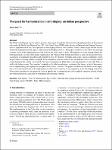Item Infomation
Full metadata record
| DC Field | Value | Language |
|---|---|---|
| dc.contributor.author | Star, Shaun | - |
| dc.date.accessioned | 2023-09-28T03:59:32Z | - |
| dc.date.available | 2023-09-28T03:59:32Z | - |
| dc.date.issued | 2022 | - |
| dc.identifier.uri | https://link.springer.com/article/10.1007/s40318-022-00220-7 | - |
| dc.identifier.uri | https://dlib.phenikaa-uni.edu.vn/handle/PNK/9327 | - |
| dc.description | CC-BY | vi |
| dc.description.abstract | The World Anti-Doping Agency aims to promote clean sport through the introduction and implementation of harmonised rules under the World Anti-Doping Code, 2021 (the Code). Since WADA relies heavily on National Anti-Doping Organisations to implement the Code, the experience of anti-doping differs across countries. Some scholars argue that the current framework disproportionately impacts athletes from developing countries. This paper contributes to this debate by analysing systemic issues in the implementation of the Code in one such country—India. The legitimacy of anti-doping in India has been questioned as a result of the recent suspension of the National Dope-Testing Laboratory, a series of false positive tests, accusations of significant procedural and substantive errors by domestic tribunals, and access to justice challenges. | vi |
| dc.language.iso | en | vi |
| dc.publisher | Springer | vi |
| dc.subject | World Anti-Doping Agency | vi |
| dc.subject | Indian perspective | vi |
| dc.title | The quest for harmonisation in anti-doping: an Indian perspective | vi |
| dc.type | Book | vi |
| Appears in Collections | ||
| OER - Pháp luật - Thể chế xã hội | ||
Files in This Item:

